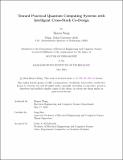Toward Practical Quantum Computing Systems with Intelligent Cross-Stack Co-Design
Author(s)
Wang, Hanrui
DownloadThesis PDF (12.68Mb)
Advisor
Han, Song
Terms of use
Metadata
Show full item recordAbstract
Quantum Computing (QC) has the potential to solve classically hard problems with greater speed and efficiency, and recent years have seen exciting advancements in this field. However, significant gaps remain between application requirements and the capabilities of current devices, particularly in terms of software framework support, efficiency, and reliability. To bridge these gaps and fully unleash the power of quantum computing, it is critical to perform AI-enhanced co-design across various technology stacks, from algorithm and program design to compilation and hardware architecture. In this thesis, we aim to develop architectural and system supports for quantum computing. To address the software support gap, I will discuss two compilation frameworks—FPQAC and Q-Pilot—designed for the Field-Programmable Qubit Array (FPQA) implemented with emerging reconfigurable neutral atom arrays. This architecture leverages movable atoms for routing two-qubit gates and we optimize atom movements and gate scheduling for high scalability and parallelism. To enhance reliability, I will introduce QuantumNAS and TorchQuantum, frameworks for quantum program structure (ansatz) design for variational quantum algorithms. QuantumNAS employs an intelligent search engine and utilizes noisy feedback from quantum devices to optimize program structure and qubit mapping tailored to specific hardware, leading to significant resource reduction and reliability improvements. Additionally, I will present QuantumNAT, QOC, and RobustState for noise-aware training of parameters in variational quantum algorithms to ensure high reliability. The DGR framework will also be discussed for addressing drifted and correlated errors in quantum error correction decoding. Furthermore, I will introduce QuEST, which leverages data-driven AI models to predict the reliability of arbitrary quantum circuits on real quantum hardware. Finally, to close the efficiency gap, I will present SpAtten, an algorithm-architecture-circuit co-design aimed at efficient Transformer-based quantum error correction decoding, and SpArch accelerator, designed for sparse tensor algebra for efficient quantum control signals generations.
Date issued
2024-05Department
Massachusetts Institute of Technology. Department of Electrical Engineering and Computer SciencePublisher
Massachusetts Institute of Technology